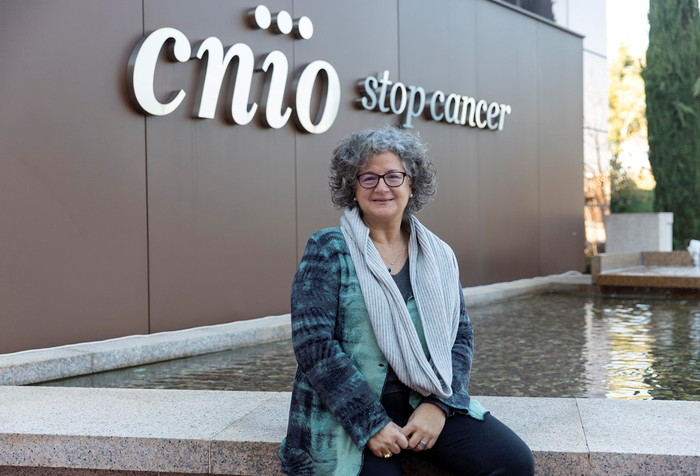Researchers in Spain, part funded by the UK charity Worldwide Cancer Research, found a genetic signature of 27 microorganisms in stool samples can identify people at high risk of pancreatic ductal adenocarcinoma, the most common pancreatic cancer, and could be used for early detection of the disease.

Credit: Please credit: Laura M. Lombardía. CNIO
Researchers in Spain, part funded by the UK charity Worldwide Cancer Research, found a genetic signature of 27 microorganisms in stool samples can identify people at high risk of pancreatic ductal adenocarcinoma, the most common pancreatic cancer, and could be used for early detection of the disease.
Pancreatic cancer is a relatively rare cancer type, but survival rates remain stubbornly low. In the UK, it’s estimated that only 1 in 4 people will survive for one year or more after their diagnosis. One of the key reasons for this is that pancreatic cancer is often diagnosed late because the symptoms are hard to spot and may not appear until later in the progression of the disease.
In the most comprehensive study to date of the influence of the microbiome on pancreatic cancer, researchers from the Spanish National Cancer Research Centre (CNIO), led by Núria Malats, and the European Molecular Biology Laboratory (EMBL) in Heidelberg, led by Peer Bork, have found a molecular signature of 27 microorganisms in stool samples that could predict whether patients are at high risk of pancreatic ductal adenocarcinoma, the most common pancreatic cancer, and even diagnose patients with earlier stages of the disease.
A patent has been applied for to develop a pancreatic cancer diagnostic kit that detects these microbial genomes in stool samples in a rapid, non-invasive, and affordable way. The study was published this week in the journal Gut.
Dr Malats and Dr Bork said: “Sophisticated biostatistical and bioinformatics analyses have allowed us to construct a signature of 27 stool-derived microbes, mostly bacteria, that discriminates very well between cases with pancreatic cancer and controls, both in their most advanced and earliest stages.”
The high predictive value of this stool gene signature could serve as a biomarker to define the population at risk and, if validated in clinical trials, it could be used for early diagnosis of pancreatic cancer.
Dr Helen Rippon, Chief Executive at Worldwide Cancer Research, said: “This new breakthrough builds on the growing evidence that the microbiome – the collection of microorganisms that live side by side with the cells inside our body – is linked to the development of cancer. What’s amazing about this discovery is that the microbiome of stool samples from patients could be used to help diagnose pancreatic cancer early. Early detection and diagnosis are just as important an approach to starting new cancer cures as developing treatments.
“Pancreatic cancer is one of those cancers that we have seen very little improvement in survival over the last few decades. It’s often diagnosed late when it has already spread to other parts of the body and treatment options for people are extremely limited. This research provides hope that an effective, non-invasive way to diagnose pancreatic cancer early is on the horizon.”
Currently, screening programmes are targeted to families with a history of pancreatic cancer, which represent only 10% of the burden of the disease. The inclusion in these screening programmes of a stool analysis to identify the identified microbial signature could help to detect the rest of the population at risk, according to the researchers.
In this new study, the researchers conducted a unique case-control study with 136 individuals (57 newly diagnosed patients, 50 controls, and 27 patients with chronic pancreatitis) who were deeply characterized at epidemiological and clinical levels and from whom samples of saliva, faeces and pancreatic tissue were taken to analyse their microbiome. The subjects were recruited from two Spanish hospitals in Madrid (Ramon y Cajal Hospital) and Barcelona (Vall Hebron Hospital).
For more information about Worldwide Cancer Research, please visit: https://www.worldwidecancerresearch.org/.
For more information about pancreatic cancer, please visit: https://www.worldwidecancerresearch.org/news-opinion/2021/november/pancreatic-cancer-everything-you-need-to-know/
About the research
This research has been carried out in collaboration with the CNIO Epithelial Carcinogenesis Group led by Paco Real, the CNIO Molecular Cytogenetics Unit led by Sandra Rodríguez, the Ramón y Cajal University Hospital Oncological Department led by Alfredo Carrato, the Vall d’ Hebron University Hospital Digestive Disease Department with Xavier Molero, the Translational Hepatology Section in Goethe University Hospital led by Jonel Trebicka, and the group of Stephan Kersting in University Clinic Erlangen.
This study has been funded by Worldwide Cancer Research, the European Research Council, the European Regional Development Fund, Spanish Ministry of Science and Innovation, the Carlos III Institute of Health, AESPANC-ACANPAN (Carmen Delgado and Miguel Pérez-Mateo grant) and the European Union (#018771-MOLDIAG-PACA, #259737-CANCERALIA).
Journal
Gut
DOI
10.1136/gutjnl-2021-324755
Subject of Research
People
Article Title
A Fecal Microbiota Signature with High Specificity for Pancreatic Cancer
Article Publication Date
8-Mar-2022



